Mary Anne Yarde's Blog: The Coffee Pot Book Club , page 230
March 22, 2016
Traitor Knight by Keith.W.Willis #BookrReview #amreading @kilbourneknight
"Oh, why hadn't she just let the dragon eat her back when she'd had the chance? It would have made everything so much simpler."
I had the pleasure of reviewing the historical fantasy Traitor Knight by Keith.W.Willis
What's the story?
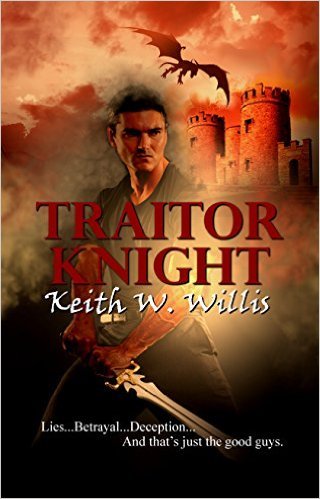 When Morgan McRobbie rescues a damsel-in-distress from a dragon, he expects she’ll swoon, murmuring “My hero!” Instead, Marissa has only loathing for the man everyone believes will betray Kilbourne. That’s fine with Morgan. A woman in his life would just complicate things.
When Morgan McRobbie rescues a damsel-in-distress from a dragon, he expects she’ll swoon, murmuring “My hero!” Instead, Marissa has only loathing for the man everyone believes will betray Kilbourne. That’s fine with Morgan. A woman in his life would just complicate things.
A high-level informer threatens the kingdom’s security, and Morgan is out to stop him. Posing as a turncoat himself, he’s walking a fine line between honor and betrayal. A single misstep could result in disaster, and his mission is fraught with distractions: the pesky dragon, a pair of conniving courtiers, and the disillusioned damsel who’s certain Morgan can’t be trusted.
If Morgan’s going to save the kingdom, win the girl, and manage to stay alive, he’ll need to step up his game. Because the traitor is lurking in the shadows, and his scheme calls not just for the betrayal of Kilbourne, but also the destruction of Morgan McRobbie.
What did I think of the story?"Amazing, simply amazing," the king said again. "This shall have to go down in song, you realize?"
"As long as I don't have to attempt the singing of it," Morgan replied.
The book open with a ferocious dragon, who's plans are thwarted - not so much by the brave heroic knight who is intent on rescuing the maiden - but by a bad, and appallingly timed case, of the hiccups.
And if that does not get your fingers twitching to turn the pages of this book, then I don't know what will!
This book was so much fun, I thoroughly enjoyed reading it. The protagonist, Morgan McRobbie - the commander of the Kilbourne Military - is everything a fine commander should be – Brave. Loyal to a fault. Honest. With a dubious reputation? Hopeless romantic ( and I mean hopeless). Traitor...okay so he is a complex character, with one or two issues to work through. But for what it is worth - I really liked him!
Lady Marissa, is just great fun. She isn’t one of those maiden's who is prone to a fainting fits when a spider runs across the room - she bravely faces down a dragon, a network of spies, Morgan and her cat! Of all the characters in this book, I think she made me laugh out loud the most. She was so much fun to read about and boy, as a love interest she was more than a match for Morgan! I even felt sorry for him on occasions - because ouch, that must have hurt!
Through out the story there is a 'real' traitor in the bosom of the court, whose secrets are as dark as his plots. But thankfully, The Watch (a police force) knows how to deal with men like him - if only the scoundrels would stop escaping from their dungeons, they would have everything in hand.
I would like to congratulate Willis on the very believable world he created -think medieval England meets fairy-tale. I soon felt at home there. All of the characters in this book had flesh on them - their individuality shone through. There was plenty of action, romance, suspense, a murder or two, a chase across the roof tops and a dragon - did I mention a dragon?
All in all, a really enjoyable read. I Highly Recommend.
Where can I buy this fabulous book?
AmazonChampagne Books Barnes & NobleSmashwords
About the author. Keith W. Willis graduated (long ago) from Berry College with a degree in English Lit. He now lives in the scenic Hudson Valley/Adirondack region of NY with his wife Patty. They have one grown son, Matt, who actually thinks it’s pretty cool that Dad wrote a book.
Keith W. Willis graduated (long ago) from Berry College with a degree in English Lit. He now lives in the scenic Hudson Valley/Adirondack region of NY with his wife Patty. They have one grown son, Matt, who actually thinks it’s pretty cool that Dad wrote a book.
Keith’s interests include camping, canoeing, and Scrabble. Keith began writing seriously in 2008, when the voices in his head got too annoying to ignore. When he’s not making up stories he manages a group of database content editors at a global information technology firm. TRAITOR KNIGHT is his first published novel.
Useful links
Facebook
Twitter : @kilbourneknight
I had the pleasure of reviewing the historical fantasy Traitor Knight by Keith.W.Willis
What's the story?
 When Morgan McRobbie rescues a damsel-in-distress from a dragon, he expects she’ll swoon, murmuring “My hero!” Instead, Marissa has only loathing for the man everyone believes will betray Kilbourne. That’s fine with Morgan. A woman in his life would just complicate things.
When Morgan McRobbie rescues a damsel-in-distress from a dragon, he expects she’ll swoon, murmuring “My hero!” Instead, Marissa has only loathing for the man everyone believes will betray Kilbourne. That’s fine with Morgan. A woman in his life would just complicate things. A high-level informer threatens the kingdom’s security, and Morgan is out to stop him. Posing as a turncoat himself, he’s walking a fine line between honor and betrayal. A single misstep could result in disaster, and his mission is fraught with distractions: the pesky dragon, a pair of conniving courtiers, and the disillusioned damsel who’s certain Morgan can’t be trusted.
If Morgan’s going to save the kingdom, win the girl, and manage to stay alive, he’ll need to step up his game. Because the traitor is lurking in the shadows, and his scheme calls not just for the betrayal of Kilbourne, but also the destruction of Morgan McRobbie.
What did I think of the story?"Amazing, simply amazing," the king said again. "This shall have to go down in song, you realize?"
"As long as I don't have to attempt the singing of it," Morgan replied.
The book open with a ferocious dragon, who's plans are thwarted - not so much by the brave heroic knight who is intent on rescuing the maiden - but by a bad, and appallingly timed case, of the hiccups.
And if that does not get your fingers twitching to turn the pages of this book, then I don't know what will!
This book was so much fun, I thoroughly enjoyed reading it. The protagonist, Morgan McRobbie - the commander of the Kilbourne Military - is everything a fine commander should be – Brave. Loyal to a fault. Honest. With a dubious reputation? Hopeless romantic ( and I mean hopeless). Traitor...okay so he is a complex character, with one or two issues to work through. But for what it is worth - I really liked him!
Lady Marissa, is just great fun. She isn’t one of those maiden's who is prone to a fainting fits when a spider runs across the room - she bravely faces down a dragon, a network of spies, Morgan and her cat! Of all the characters in this book, I think she made me laugh out loud the most. She was so much fun to read about and boy, as a love interest she was more than a match for Morgan! I even felt sorry for him on occasions - because ouch, that must have hurt!
Through out the story there is a 'real' traitor in the bosom of the court, whose secrets are as dark as his plots. But thankfully, The Watch (a police force) knows how to deal with men like him - if only the scoundrels would stop escaping from their dungeons, they would have everything in hand.
I would like to congratulate Willis on the very believable world he created -think medieval England meets fairy-tale. I soon felt at home there. All of the characters in this book had flesh on them - their individuality shone through. There was plenty of action, romance, suspense, a murder or two, a chase across the roof tops and a dragon - did I mention a dragon?
All in all, a really enjoyable read. I Highly Recommend.
Where can I buy this fabulous book?
AmazonChampagne Books Barnes & NobleSmashwords
About the author.
 Keith W. Willis graduated (long ago) from Berry College with a degree in English Lit. He now lives in the scenic Hudson Valley/Adirondack region of NY with his wife Patty. They have one grown son, Matt, who actually thinks it’s pretty cool that Dad wrote a book.
Keith W. Willis graduated (long ago) from Berry College with a degree in English Lit. He now lives in the scenic Hudson Valley/Adirondack region of NY with his wife Patty. They have one grown son, Matt, who actually thinks it’s pretty cool that Dad wrote a book.Keith’s interests include camping, canoeing, and Scrabble. Keith began writing seriously in 2008, when the voices in his head got too annoying to ignore. When he’s not making up stories he manages a group of database content editors at a global information technology firm. TRAITOR KNIGHT is his first published novel.
Useful links
Twitter : @kilbourneknight
Published on March 22, 2016 00:07
March 21, 2016
The Du Lac Chronicles - a Labour of Love.
Those of you who are regular readers to my blog will know that on a Wednesday I open the blog up to other historical / mythological writers to discuss their inspiration behind their books. I have just realised, that I have never done this for my book!! So today, I thought I would rectify this situation and tell you about my inspirations behind my YA novel, The Du Lac Chronicles. Enjoy...
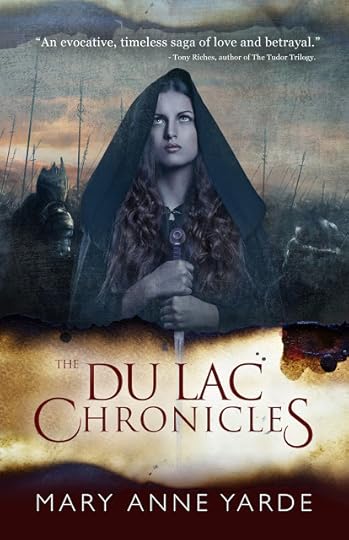
If all you had left was your heart, would you give it to your enemy?
A generation after Arthur Pendragon ruled, Briton lies fragmented into warring kingdoms. The powerful Saxon King, Cerdic of Wessex, spent the last twenty years hunting down Arthur’s noble knights. Alden du Lac, the once king of Cerniw and son of Lancelot, has nothing. Betrayed by Cerdic, Alden’s kingdom lies in rubble. Annis, daughter of King Cerdic of Wessex, has been secretly in love with Alden for what seems like forever. She will not stand by and see him die. She defies father, king, and country to save the man she loves from her father’s dungeons. Alden and Annis flee Wessex together.
***
There is something very appealing about chivalry and honour. It is no surprise that the stories of King Arthur and his knights have etched their way into the hearts of a nation. They certainly found their way into my heart at a very early age. Their stories were part of my childhood – growing up very near Glastonbury, I guess that is not really surprising.
 Glastonbury Tor
Glastonbury Tor
However, I always felt slightly deflated by the ending of Arthur’s story. There is a terrible battle at Camlann where Arthur is mortally wounded. He is whisked away to Avalon and that is the last that we hear of him. Likewise, his knights if they have not already been killed, tend to end their days as hermits. I never really bought into that ending. It was just too final and far too vague.
I started to research the era and was fascinated with what I learnt. In particular I became very interested in a Saxon called Cerdic. In AD 519, Cerdic of Wessex - according to The Anglo-Saxon Chronicles – became the first West-Saxon King of Britain. His journey to being crowned is quite extraordinary. He landed in Hampshire at the end of the fifth Century. He and his son, raged war across the Southern kingdoms of England – conquered most of them, and brought a sort of unity to the south that had not been seen since the Roman era.
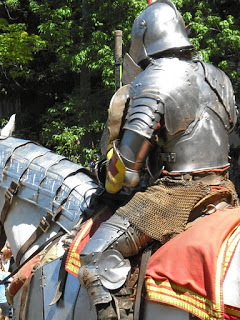 But here is where it got interesting for me. Cerdic’s exploits and Arthur’s legendary legacy became entwined. Some say the their armies once met at Badon Hill. I wanted to explore this possibility some more, and this is where my inspiration for The Du Lac Chronicles came from.
But here is where it got interesting for me. Cerdic’s exploits and Arthur’s legendary legacy became entwined. Some say the their armies once met at Badon Hill. I wanted to explore this possibility some more, and this is where my inspiration for The Du Lac Chronicles came from.
The Du Lac Chronicles is set a generation after the fall of King Arthur and I wanted to create a story where the knights did not end up in monasteries and then disappeared into the shadows of history. I wanted to write about what happened after Arthur died. In particular, I wanted to write about the changing ‘Saxon’ world that these knights now found themselves in.
The Du Lac Chronicles follows - through the eyes of Lancelot du Lac’s sons - Cerdic of Wessex’s campaign to become High King. The world the du Lac’s had known was to be changed forever by this one man’s determination to enslave the kingdoms under the Saxon yolk. In my story these men, these knights, do not die easily and they certainly do not become hermits!
Where can I buy this knightly book?
Amazon USAmazon UK
Be sure to pop over to...Facebook and say hello! https://www.facebook.com/maryanneyard... can find me on Twitter too! @maryanneyarde

If all you had left was your heart, would you give it to your enemy?
A generation after Arthur Pendragon ruled, Briton lies fragmented into warring kingdoms. The powerful Saxon King, Cerdic of Wessex, spent the last twenty years hunting down Arthur’s noble knights. Alden du Lac, the once king of Cerniw and son of Lancelot, has nothing. Betrayed by Cerdic, Alden’s kingdom lies in rubble. Annis, daughter of King Cerdic of Wessex, has been secretly in love with Alden for what seems like forever. She will not stand by and see him die. She defies father, king, and country to save the man she loves from her father’s dungeons. Alden and Annis flee Wessex together.
***
There is something very appealing about chivalry and honour. It is no surprise that the stories of King Arthur and his knights have etched their way into the hearts of a nation. They certainly found their way into my heart at a very early age. Their stories were part of my childhood – growing up very near Glastonbury, I guess that is not really surprising.
 Glastonbury Tor
Glastonbury TorHowever, I always felt slightly deflated by the ending of Arthur’s story. There is a terrible battle at Camlann where Arthur is mortally wounded. He is whisked away to Avalon and that is the last that we hear of him. Likewise, his knights if they have not already been killed, tend to end their days as hermits. I never really bought into that ending. It was just too final and far too vague.
I started to research the era and was fascinated with what I learnt. In particular I became very interested in a Saxon called Cerdic. In AD 519, Cerdic of Wessex - according to The Anglo-Saxon Chronicles – became the first West-Saxon King of Britain. His journey to being crowned is quite extraordinary. He landed in Hampshire at the end of the fifth Century. He and his son, raged war across the Southern kingdoms of England – conquered most of them, and brought a sort of unity to the south that had not been seen since the Roman era.
 But here is where it got interesting for me. Cerdic’s exploits and Arthur’s legendary legacy became entwined. Some say the their armies once met at Badon Hill. I wanted to explore this possibility some more, and this is where my inspiration for The Du Lac Chronicles came from.
But here is where it got interesting for me. Cerdic’s exploits and Arthur’s legendary legacy became entwined. Some say the their armies once met at Badon Hill. I wanted to explore this possibility some more, and this is where my inspiration for The Du Lac Chronicles came from.The Du Lac Chronicles is set a generation after the fall of King Arthur and I wanted to create a story where the knights did not end up in monasteries and then disappeared into the shadows of history. I wanted to write about what happened after Arthur died. In particular, I wanted to write about the changing ‘Saxon’ world that these knights now found themselves in.
The Du Lac Chronicles follows - through the eyes of Lancelot du Lac’s sons - Cerdic of Wessex’s campaign to become High King. The world the du Lac’s had known was to be changed forever by this one man’s determination to enslave the kingdoms under the Saxon yolk. In my story these men, these knights, do not die easily and they certainly do not become hermits!
Where can I buy this knightly book?
Amazon USAmazon UK
Be sure to pop over to...Facebook and say hello! https://www.facebook.com/maryanneyard... can find me on Twitter too! @maryanneyarde
Published on March 21, 2016 07:03
The Du Lac Chroincles - a Labour of Love.
Those of you who are regular readers to my blog will know that on a Wednesday I open the blog up to other historical / mythological writers to discuss their inspiration behind their books. I have just realised, that I have never done this for my book!! So today, I thought I would rectify this situation and tell you about my inspirations behind my YA novel, The Du Lac Chronicles. Enjoy...

If all you had left was your heart, would you give it to your enemy?
A generation after Arthur Pendragon ruled, Briton lies fragmented into warring kingdoms. The powerful Saxon King, Cerdic of Wessex, spent the last twenty years hunting down Arthur’s noble knights. Alden du Lac, the once king of Cerniw and son of Lancelot, has nothing. Betrayed by Cerdic, Alden’s kingdom lies in rubble. Annis, daughter of King Cerdic of Wessex, has been secretly in love with Alden for what seems like forever. She will not stand by and see him die. She defies father, king, and country to save the man she loves from her father’s dungeons. Alden and Annis flee Wessex together.
***
There is something very appealing about chivalry and honour. It is no surprise that the stories of King Arthur and his knights have etched their way into the hearts of a nation. They certainly found their way into my heart at a very early age. Their stories were part of my childhood – growing up very near Glastonbury, I guess that is not really surprising.
 Glastonbury Tor
Glastonbury Tor
However, I always felt slightly deflated by the ending of Arthur’s story. There is a terrible battle at Camlann where Arthur is mortally wounded. He is whisked away to Avalon and that is the last that we hear of him. Likewise, his knights if they have not already been killed, tend to end their days as hermits. I never really bought into that ending. It was just too final and far too vague.
I started to research the era and was fascinated with what I learnt. In particular I became very interested in a Saxon called Cerdic. In AD 519, Cerdic of Wessex - according to The Anglo-Saxon Chronicles – became the first West-Saxon King of Britain. His journey to being crowned is quite extraordinary. He landed in Hampshire at the end of the fifth Century. He and his son, raged war across the Southern kingdoms of England – conquered most of them, and brought a sort of unity to the south that had not been seen since the Roman era.
 But here is where it got interesting for me. Cerdic’s exploits and Arthur’s legendary legacy became entwined. Some say the their armies once met at Badon Hill. I wanted to explore this possibility some more, and this is where my inspiration for The Du Lac Chronicles came from.
But here is where it got interesting for me. Cerdic’s exploits and Arthur’s legendary legacy became entwined. Some say the their armies once met at Badon Hill. I wanted to explore this possibility some more, and this is where my inspiration for The Du Lac Chronicles came from.
The Du Lac Chronicles is set a generation after the fall of King Arthur and I wanted to create a story where the knights did not end up in monasteries and then disappeared into the shadows of history. I wanted to write about what happened after Arthur died. In particular, I wanted to write about the changing ‘Saxon’ world that these knights now found themselves in.
The Du Lac Chronicles follows - through the eyes of Lancelot du Lac’s sons - Cerdic of Wessex’s campaign to become High King. The world the du Lac’s had known was to be changed forever by this one man’s determination to enslave the kingdoms under the Saxon yolk. In my story these men, these knights, do not die easily and they certainly do not become hermits!
Where can I buy this knightly book?
Amazon USAmazon UK
Be sure to pop over to...Facebook and say hello! https://www.facebook.com/maryanneyard... can find me on Twitter too! @maryanneyarde

If all you had left was your heart, would you give it to your enemy?
A generation after Arthur Pendragon ruled, Briton lies fragmented into warring kingdoms. The powerful Saxon King, Cerdic of Wessex, spent the last twenty years hunting down Arthur’s noble knights. Alden du Lac, the once king of Cerniw and son of Lancelot, has nothing. Betrayed by Cerdic, Alden’s kingdom lies in rubble. Annis, daughter of King Cerdic of Wessex, has been secretly in love with Alden for what seems like forever. She will not stand by and see him die. She defies father, king, and country to save the man she loves from her father’s dungeons. Alden and Annis flee Wessex together.
***
There is something very appealing about chivalry and honour. It is no surprise that the stories of King Arthur and his knights have etched their way into the hearts of a nation. They certainly found their way into my heart at a very early age. Their stories were part of my childhood – growing up very near Glastonbury, I guess that is not really surprising.
 Glastonbury Tor
Glastonbury TorHowever, I always felt slightly deflated by the ending of Arthur’s story. There is a terrible battle at Camlann where Arthur is mortally wounded. He is whisked away to Avalon and that is the last that we hear of him. Likewise, his knights if they have not already been killed, tend to end their days as hermits. I never really bought into that ending. It was just too final and far too vague.
I started to research the era and was fascinated with what I learnt. In particular I became very interested in a Saxon called Cerdic. In AD 519, Cerdic of Wessex - according to The Anglo-Saxon Chronicles – became the first West-Saxon King of Britain. His journey to being crowned is quite extraordinary. He landed in Hampshire at the end of the fifth Century. He and his son, raged war across the Southern kingdoms of England – conquered most of them, and brought a sort of unity to the south that had not been seen since the Roman era.
 But here is where it got interesting for me. Cerdic’s exploits and Arthur’s legendary legacy became entwined. Some say the their armies once met at Badon Hill. I wanted to explore this possibility some more, and this is where my inspiration for The Du Lac Chronicles came from.
But here is where it got interesting for me. Cerdic’s exploits and Arthur’s legendary legacy became entwined. Some say the their armies once met at Badon Hill. I wanted to explore this possibility some more, and this is where my inspiration for The Du Lac Chronicles came from.The Du Lac Chronicles is set a generation after the fall of King Arthur and I wanted to create a story where the knights did not end up in monasteries and then disappeared into the shadows of history. I wanted to write about what happened after Arthur died. In particular, I wanted to write about the changing ‘Saxon’ world that these knights now found themselves in.
The Du Lac Chronicles follows - through the eyes of Lancelot du Lac’s sons - Cerdic of Wessex’s campaign to become High King. The world the du Lac’s had known was to be changed forever by this one man’s determination to enslave the kingdoms under the Saxon yolk. In my story these men, these knights, do not die easily and they certainly do not become hermits!
Where can I buy this knightly book?
Amazon USAmazon UK
Be sure to pop over to...Facebook and say hello! https://www.facebook.com/maryanneyard... can find me on Twitter too! @maryanneyarde
Published on March 21, 2016 07:03
Free on Kindle 21-23 March - The Du Lac Chronicles #romance #hisfic #freebooks
To celebrate my birthday The Du Lac Chronicles will be available for free on Kindle between the 21st - 23rd March. So what are you waiting for? download your free copy today.
Amazon USAmazon UK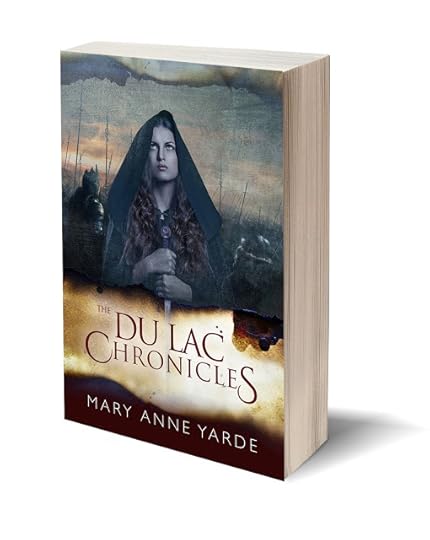 5* Reviews
5* Reviews
"An evocative, timeless saga of love and betrayal" Tony Riches, author of The Tudor Trilogy.
"I was totally enthralled from start to finish."Amazon reviewer
"Book one of "The Du Lac Chronicles" is an outstanding historical fiction novel that is destined to be a classic!" Amazon reviewer
***
“It is dangerous to become attached to a du Lac. He will break your heart, and you will not recover.”
So prophesies a wizened healer to Annis, daughter of King Cerdic of Wessex. If there is truth in the old crone’s words, they come far too late for Annis, who defies father, king, and country to save the man she loves.
Alden du Lac, once king of Cerniw, has nothing. Betrayed by Cerdic, Alden’s kingdom lies in rubble, his fort razed to the ground and his brother Merton missing, presumably dead. He has only one possession left worth saving: his heart. And to the horror of his few remaining allies, he gives that to the daughter of his enemy. They see Annis, at best, as a bargaining chip to avoid war with her powerful father. At worst, they see a Saxon whore with her claws in a broken, wounded king.
Alden has one hope: When you war with one du Lac, you war with them all. His brother Budic, King of Brittany, could offer the deposed young king sanctuary—but whether he will offer the same courtesy to Annis is far less certain.
Amazon USAmazon UK
Amazon USAmazon UK
 5* Reviews
5* Reviews"An evocative, timeless saga of love and betrayal" Tony Riches, author of The Tudor Trilogy.
"I was totally enthralled from start to finish."Amazon reviewer
"Book one of "The Du Lac Chronicles" is an outstanding historical fiction novel that is destined to be a classic!" Amazon reviewer
***
“It is dangerous to become attached to a du Lac. He will break your heart, and you will not recover.”
So prophesies a wizened healer to Annis, daughter of King Cerdic of Wessex. If there is truth in the old crone’s words, they come far too late for Annis, who defies father, king, and country to save the man she loves.
Alden du Lac, once king of Cerniw, has nothing. Betrayed by Cerdic, Alden’s kingdom lies in rubble, his fort razed to the ground and his brother Merton missing, presumably dead. He has only one possession left worth saving: his heart. And to the horror of his few remaining allies, he gives that to the daughter of his enemy. They see Annis, at best, as a bargaining chip to avoid war with her powerful father. At worst, they see a Saxon whore with her claws in a broken, wounded king.
Alden has one hope: When you war with one du Lac, you war with them all. His brother Budic, King of Brittany, could offer the deposed young king sanctuary—but whether he will offer the same courtesy to Annis is far less certain.
Amazon USAmazon UK
Published on March 21, 2016 00:11
Free on Kindle 21-23 March - The Du Lac Chroniclse #romance #hisfic #freebooks
To celebrate my birthday The Du Lac Chronicles will be available for free on Kindle between the 21st - 23rd March. So what are you waiting for? download your free copy today.
Amazon USAmazon UK 5* Reviews
5* Reviews
"An evocative, timeless saga of love and betrayal" Tony Riches, author of The Tudor Trilogy.
"I was totally enthralled from start to finish."Amazon reviewer
"Book one of "The Du Lac Chronicles" is an outstanding historical fiction novel that is destined to be a classic!" Amazon reviewer
***
“It is dangerous to become attached to a du Lac. He will break your heart, and you will not recover.”
So prophesies a wizened healer to Annis, daughter of King Cerdic of Wessex. If there is truth in the old crone’s words, they come far too late for Annis, who defies father, king, and country to save the man she loves.
Alden du Lac, once king of Cerniw, has nothing. Betrayed by Cerdic, Alden’s kingdom lies in rubble, his fort razed to the ground and his brother Merton missing, presumably dead. He has only one possession left worth saving: his heart. And to the horror of his few remaining allies, he gives that to the daughter of his enemy. They see Annis, at best, as a bargaining chip to avoid war with her powerful father. At worst, they see a Saxon whore with her claws in a broken, wounded king.
Alden has one hope: When you war with one du Lac, you war with them all. His brother Budic, King of Brittany, could offer the deposed young king sanctuary—but whether he will offer the same courtesy to Annis is far less certain.
Amazon USAmazon UK
Amazon USAmazon UK
 5* Reviews
5* Reviews"An evocative, timeless saga of love and betrayal" Tony Riches, author of The Tudor Trilogy.
"I was totally enthralled from start to finish."Amazon reviewer
"Book one of "The Du Lac Chronicles" is an outstanding historical fiction novel that is destined to be a classic!" Amazon reviewer
***
“It is dangerous to become attached to a du Lac. He will break your heart, and you will not recover.”
So prophesies a wizened healer to Annis, daughter of King Cerdic of Wessex. If there is truth in the old crone’s words, they come far too late for Annis, who defies father, king, and country to save the man she loves.
Alden du Lac, once king of Cerniw, has nothing. Betrayed by Cerdic, Alden’s kingdom lies in rubble, his fort razed to the ground and his brother Merton missing, presumably dead. He has only one possession left worth saving: his heart. And to the horror of his few remaining allies, he gives that to the daughter of his enemy. They see Annis, at best, as a bargaining chip to avoid war with her powerful father. At worst, they see a Saxon whore with her claws in a broken, wounded king.
Alden has one hope: When you war with one du Lac, you war with them all. His brother Budic, King of Brittany, could offer the deposed young king sanctuary—but whether he will offer the same courtesy to Annis is far less certain.
Amazon USAmazon UK
Published on March 21, 2016 00:11
March 20, 2016
The Lady of the Lake - who was she and what does she have to do with King Arthur?
"I cannot tell how the truth may be; I say the tale as 'twas said to me." Walter Scott
The hand rising out of the water, clutching King Arthur's mighty Excalibur -- That is the image I see when I think of the Lady of the Lake.

Of course there is a great deal more to the Lady of the Lake than merely a hand sticking out of a lake with a sword clutched in it! She plays a pivotal role in many of the stories of Arthur and his knights - most notably in the story of Lancelot.
In Arthurian Legend she is best remembered for:
*Giving Arthur, Excalibur.
*Enchanting Merlin.
*Raising Lancelot after his father's death.
*Nurses Lancelot back to health when he loses his mind.
Let us take a look at the stories and see how the character of The Lady of the Lake developed.
It is in the Lancelot-Grail Cycle where we first learn about The Lady of the Lake. Her name was Vivianne and she is the apprentice of Merlin. Merlin loves her dearly, despite knowing, for he has foreseen, that Viviane will be his undoing, his destruction, his doom! She wants to know all his secrets - she wishes to become as powerful as he is.
Merlin cannot resist her charms. Ignoring the risks, he tells her everything. In return she traps him in a tree - or was it a cave? - a stone? Anyway, he is entombed and apart from the odd wailing that is said to be heard from Merlin's Cave in Wales every so often, he is never heard of again. Such is life.
In the Post-Vulgate Cycle's, her name changed to Ninianne, and Excalibur makes an appearance.
Sir Robert Malory and The Lady of the Lake.
In Malory's epic tale there are two Ladies of the Lake. Nimue and Nyneve - the reason soon becomes apparent.
Nimue
Nimue is not the typical Arthurian lady - think of all the women you meet in Arthurian Legend - some of the worst villains are, in fact, women - Morgan La Fay being the obvious one, but remember, even Guinevere brings down a kingdom with her notorious affair with Lancelot. No, Nimue is not like them, she is a force for good. She is married to Sir Pelleas, and is seemingly obedient to her husband, but secretly she sways the court of Camelot to do what is right and what is good. She is clever, but sympathetic. Strong, yet kind.
Although, saying that...in Le Morte d'Arthur, after she enchants Merlin, and subsequently entombs him, she then takes his place as Arthur's closest adviser. When Arthur is mortally wounded she travels with him back to Avalon and takes the sword back.

Edward Burne-Jones (1872-1877) The Beguiling of Merlin.
Nyneve
Nyneve is the other Lady of the Lake - she too marries Sir Pelleas and is a force for good. She is also linked with giving Arthur, Excalibur. It is interesting that in this story, Arthur receives Excalibur not once, but three times:
Firstly he pulls the sword from the stone.
Then he is given the sword from the Lady of the Lake.
And lastly, Nyneve presents Arthur with the sword in the midst of battle??!
When ever Arthur is in trouble the Lady of the Lake seemingly helps him. A fairy godmother if you like...minus the pumpkin! Instead she brings swords - far more useful.
Nyneve first appears in the tale of Arthur's wedding - noticeable the same time that The Round Table does, and the two have often been linked with this whole idea of chivalry and the Knights Code of Honour ever since.
The story of the Lady of the Lake has enchanted storytellers and their audience alike. Sir Walter Scott wrote the famous Lady of the Lake poem in 1810. Alfred Lord Tennyson also took an interest in this Arthurian character and immortalized her in Idylls of the King. Interestingly, like with Malory, he writes of two Ladies of the Lake. The first being Vivian - the deceitful woman who ensnares Merlin and her opposite, the Lady of the Lake who raised Lancelot and gives Arthur his sword.
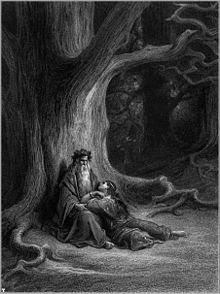
Gustave Dore's - Viviane and Merlin (1868). The question remains, of course...where is the lake? We could start with Avalon and work our way around from there - that's if anyone can agree to where Avalon actually is! There are so many supposed locations of where the lake could be, that I am not going to bother to list them in fear that I will miss a location out! But still, it's a good story isn't it.
Competition time!!!
How would you like to win a signed copy of The Du Lac Chronicles? All you have to do is post a comment telling me about your favourite Arthurian Character and why you like them so much!
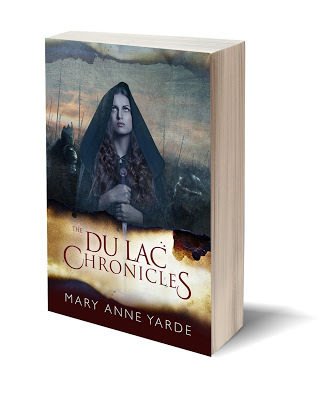
A generation after the fall of Arthur Pendragon...
“It is dangerous to become attached to a du Lac. He will break your heart, and you will not recover.”
So prophesies a wizened healer to Annis, daughter of King Cerdic of Wessex. If there is truth in the old crone’s words, they come far too late for Annis, who defies father, king, and country to save the man she loves.
Alden du Lac, once king of Cerniw, has nothing. Betrayed by Cerdic, Alden’s kingdom lies in rubble, his fort razed to the ground and his brother Merton missing, presumably dead. He has only one possession left worth saving: his heart. And to the horror of his few remaining allies, he gives that to the daughter of his enemy. They see Annis, at best, as a bargaining chip to avoid war with her powerful father. At worst, they see a Saxon witch with her claws in a broken, wounded king.
Alden has one hope: When you war with one du Lac, you war with them all. His brother Budic, King of Brittany, could offer the deposed young king sanctuary—but whether he will offer the same courtesy to Annis is far less certain.
Or alternatively, pick up your copy from Amazon!
Amazon USAmazon UK
Published on March 20, 2016 04:55
March 18, 2016
Excalibur - The Sword in the Stone
"In the midst of the lake Arthur was ware of an arm clothed in white samite, that held a fair sword in that hand." Malory

If I was asked to name a famous sword then Excalibur would be the first sword I would think of - but then considering my small obsession with Arthurian legend, I guess that is hardly a surprise!
In today's blog, I want to find out how and where Excalibur fits into the Arthurian story. Let us first look at the name. Excalibur...
Its origins can be traced way, way back to the Welsh works - although then it went by the name Caledfwlch. It can also be traced back to Irish mythology. Perhaps, Caledfwich was just a name given to swords in general - but for some reason, the name became associated with Arthurian legend and more importantly, it was the name given to Arthur's sword.
Monmouth is again, responsible for placing this sword in Arthur's hands. In The History of the King's of Britain, c.1136, Monmouth, Latinised the name of the sword and it became known as Caliburnus and he stated that it was forged in the Isles of Avalon...and his story kind of stuck.
Geoffrey Gaimer - an Anglo-Norman Chronicler who wrote the History Of The English People, carried on with this theme "...this Constantine was the nephew of Arthur, who had the sword Calibure..."
By the time Chrétien de Troyes got his hands on the story...
"...for at his belt (he is talking about Gawain) hung Excalibur, the finest sword that there was, which sliced through iron as through wood..."
The Sword in the Stone
"Whoso Pulleth Out This Sword of this Stone and Anvil, is Rightwise King Born of all England" Malory
Most of us would be familiar with the Malory quote above - it has been quoted countless times. Most notably in the Disney move, The Sword in the Stone. But it was not Malory who came up with this whole 'pull a sword from a stone and become king,' idea, but Robert de Boron, in his great work Merlin. But once Boron suggested such a thing, the story took flight and very soon became...well, a legend.
Interestingly, it wasn't just Arthur who pulled a sword from a stone - Galahad did as well!
For me, the story of Arthur does not seem right without a mention of the sword in the stone, it goes hand-in-hand with the stories of Arthur as much as Camelot does.
Most recently, this theme was portrayed in the BBC drama, Merlin. Similar to many of the stories...it is Merlin that places the sword in the stone.
Merlin - series 4, episode 13
Excalibur and the Lady of the Lake
The link between Excalibur and the Lady of the Lake was first suggested in the Post-Vulgate Cycle. In this story, Arthur does not pull the sword from a stone, but he is, instead, gifted the weapon from the Lady of the Lake, near the beginning of his reign. In Vulgate Mort Artu - Arthur orders the sword to be thrown back to the lake when he is fatally wounded.
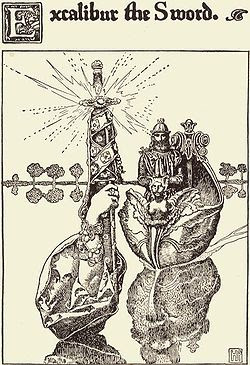 Excalibur the Sword, by Howard Pyle (1902)
Excalibur the Sword, by Howard Pyle (1902)
Malory - the master storyteller - tells of both version in Le Morte d"Arthur - he made sure he had all his basis covered!
Excalibur - a magic sword?
Again, we have Malory to thank for this interpretation.
"thenne he drewe his swerd Excalibur, but it was so breyght in his enemyes eyen that it gaf light lyke thirty torchys." Malory
And let's not forget the magic scabbard and its magic powers. The one who wore the scabbard was protected in battle. Unfortunately Morgan Le Fay got her hands on it and threw it back in the lake, and that was the end of that.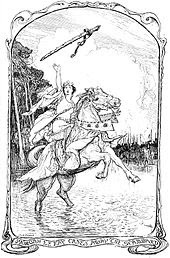 Morgan La Fay casts the Scabbard away by Henry Justice Ford 1902
Morgan La Fay casts the Scabbard away by Henry Justice Ford 1902
It is often said that on the blade of Excalibur there was an engraving which said...
"Take me up" and "Cast me away"
Meaning simply to throw the sword back into the lake when the owner was finished with it and that is exactly what Arthur commanded Sir Bedivere to do. And on that note...I think we will leave it there for the day!

If I was asked to name a famous sword then Excalibur would be the first sword I would think of - but then considering my small obsession with Arthurian legend, I guess that is hardly a surprise!
In today's blog, I want to find out how and where Excalibur fits into the Arthurian story. Let us first look at the name. Excalibur...
Its origins can be traced way, way back to the Welsh works - although then it went by the name Caledfwlch. It can also be traced back to Irish mythology. Perhaps, Caledfwich was just a name given to swords in general - but for some reason, the name became associated with Arthurian legend and more importantly, it was the name given to Arthur's sword.
Monmouth is again, responsible for placing this sword in Arthur's hands. In The History of the King's of Britain, c.1136, Monmouth, Latinised the name of the sword and it became known as Caliburnus and he stated that it was forged in the Isles of Avalon...and his story kind of stuck.
Geoffrey Gaimer - an Anglo-Norman Chronicler who wrote the History Of The English People, carried on with this theme "...this Constantine was the nephew of Arthur, who had the sword Calibure..."
By the time Chrétien de Troyes got his hands on the story...
"...for at his belt (he is talking about Gawain) hung Excalibur, the finest sword that there was, which sliced through iron as through wood..."
The Sword in the Stone
"Whoso Pulleth Out This Sword of this Stone and Anvil, is Rightwise King Born of all England" Malory
Most of us would be familiar with the Malory quote above - it has been quoted countless times. Most notably in the Disney move, The Sword in the Stone. But it was not Malory who came up with this whole 'pull a sword from a stone and become king,' idea, but Robert de Boron, in his great work Merlin. But once Boron suggested such a thing, the story took flight and very soon became...well, a legend.
Interestingly, it wasn't just Arthur who pulled a sword from a stone - Galahad did as well!
For me, the story of Arthur does not seem right without a mention of the sword in the stone, it goes hand-in-hand with the stories of Arthur as much as Camelot does.
Most recently, this theme was portrayed in the BBC drama, Merlin. Similar to many of the stories...it is Merlin that places the sword in the stone.
Merlin - series 4, episode 13
Excalibur and the Lady of the Lake
The link between Excalibur and the Lady of the Lake was first suggested in the Post-Vulgate Cycle. In this story, Arthur does not pull the sword from a stone, but he is, instead, gifted the weapon from the Lady of the Lake, near the beginning of his reign. In Vulgate Mort Artu - Arthur orders the sword to be thrown back to the lake when he is fatally wounded.
 Excalibur the Sword, by Howard Pyle (1902)
Excalibur the Sword, by Howard Pyle (1902) Malory - the master storyteller - tells of both version in Le Morte d"Arthur - he made sure he had all his basis covered!
Excalibur - a magic sword?
Again, we have Malory to thank for this interpretation.
"thenne he drewe his swerd Excalibur, but it was so breyght in his enemyes eyen that it gaf light lyke thirty torchys." Malory
And let's not forget the magic scabbard and its magic powers. The one who wore the scabbard was protected in battle. Unfortunately Morgan Le Fay got her hands on it and threw it back in the lake, and that was the end of that.
 Morgan La Fay casts the Scabbard away by Henry Justice Ford 1902
Morgan La Fay casts the Scabbard away by Henry Justice Ford 1902 It is often said that on the blade of Excalibur there was an engraving which said...
"Take me up" and "Cast me away"
Meaning simply to throw the sword back into the lake when the owner was finished with it and that is exactly what Arthur commanded Sir Bedivere to do. And on that note...I think we will leave it there for the day!
Published on March 18, 2016 00:14
March 16, 2016
Guest Post - author Anne O'Brien talks of her inspirations @anne_obrien
Today I welcome The Sunday Times best seller, Anne O'Brien, to talk about the inspirations behind her latest book.
Take it away, Anne...

'O’Brien cleverly intertwines the personal and political in this enjoyable, gripping tale.' - The Times
Her children or her crown
France, 1399: The Duke of Brittany is dead and his widow, Joanna of Navarre, has inherited the Regency over their land – a testament to her intellect, integrity and political prowess.
Then comes an unprecedented proposal from Henry IV, King of England. The price of becoming his Queen? Abandoning Brittany, leaving her children and sacrificing her independence.
Henry's hold on the crown is unsteady and war is brewing. With the constant threat of rebellion, Henry will trust no-one – not even his new Queen. Crossing the channel is a dangerous prospect. But the union between Joanna and Henry would bring the chance of a vital alliance between two proud states – if they will allow it.
One question. Two paths. A choice that will make history.
***
Royal Wives, Sisters and Mistresses
The Lot of Medieval Women
What was it that inspired me to write about women of the medieval English Court in general and Joanna of Navarre, in my recent novel The Queen's Choice, in particular?
It was in answer to this question: why is it that so many medieval women have remained almost invisible, while the sins or exploits of their husbands are legendary? King John is notorious but few would claim to know much about Isabelle of Angouleme. Richard II, is brilliant, usurped and tragic, thanks to Shakespeare, yet Anne of Bohemia hardly makes a mark, and even less Isabelle de Valois (although she was only six when she became Richard's wife which will account for much). Edward I, Hammer of the Scots, built castles and led his armies. Who can relate more than the basic facts about Eleanor of Castile, other than the romantic tale of Eleanor Crosses erected by her grief-stricken husband. Which probably says more about Edward than it does about Eleanor.
Even women from aristocratic families, or with scandalous connections, fare little better, other than the salacious details of the scandal. Alice Perrers, mistress of King Edward III, has come down through history with a particularly bad press, but so little of her life is underpinned with evidence. Even her name comes from an early short-lived marriage. Elizabeth of Lancaster was the younger daughter of John of Gaunt and Blanche of Lancaster but apart from the scandal attached to her name, she has almost vanished into the mists of time. Joan of Kent, notable for her clandestine marriages, is clouded in 'possibles' and 'probables'.
As Virginia Wolfe once said: 'For most of History, Anonymous was a woman.'
Were these women so lacking in authority, in influence or even in intelligence? Were they uneducated, fit for nothing but to be decorative witnesses to the daring or desperate ventures of their husbands? The impression is that they remained solar-bound, waiting for their menfolk to return from war, plying a needle as they sang and prayed and gossiped in a feminine world. I could not believe that this was the truth. It seemed to me improbable that these medieval women should have nothing to say about what they and their regal husbands were doing. How could they be mere onlookers, with no opinion of the people and the political goings-on around them?
So why are they so difficult to rediscover? The answer is simple enough. They are silent because they lived in a man's world, written by men, about the feats of men. Women are given no voice, not even royal women, except for the very few, such as the infamous Eleanor of Aquitaine whom it was difficult to silence, yet even she was incarcerated by an enraged Henry II for stirring rebellion amongst their sons. Women are recorded for us in their relationships with men: a daughter, a sister, a wife. Thus our medieval women, even those with status, are skeletons without flesh, two dimensional in their lack of character, without even a physical description since medieval portraits are rare. The few women who leave behind some idea of their thought processes are those who write, frequently women who have taken the veil, such as Julian of Norwich, or remarkable authors such as Christine de Pisan and Margery Kempe.
For this reason, I decided to shake the cobwebs from some of these women, fitting them into the historical context in which they lived. Anne Neville into the years of the War of the Roses, a pawn in the game of marriage and power-brokering. Alice Perrers who proved to be just as ambitious and manipulating as we might expect but also the smart business-woman of the fourteenth century.
Katherine de Valois, a political bride for Henry V who managed to snatch some happiness with Owen Tudor in her tragic life. Katherine Swynford whose liaison with John of Gaunt was so much more than a light-hearted love affair, bringing with it the taint of sin and massive disapproval. Elizabeth of Lancaster whose marriage to John Holand dragged her into the depths of treason with husband set against brother. How much these women had to say, when given the opportunity to do so.
And most recently in The Queen's Choice: the Queen of England who proved to be more invisible than most is Joanna of Navarre. Who has even heard of Queen Joanna of England, who in 1403 was invested as Queen Consort in Westminster Abbey, with crown and sceptre, as wife of King Henry IV? A remarkable woman, regal from her toes to her fingertips, she was daughter of King Charles II (the Bad) of Navarre and Joan de Valois who was a daughter of King John II (the Good) of France. Through this pedigree Joanna was related to almost every important family in Europe through either blood or marriage. Wife of the Duke of Brittany, she became Regent for her young son on her first husband's death. Yet Joanna is fortunate if she manages more than a few paragraphs in most history texts.
The research to discover Queen Joanna, to breathe new life into her, proved to be exhilarating. Unpopular as a Breton by her first marriage, accused of greed over her extortionate dowry, she soon came under attack for her extensive Breton household and her suspect opinion on English foreign policy. But what more is there to say? Delving into the dark political issues of the reign of Henry IV gave real depth to Joanna's world. What a troubled reign it was, with insurrection, civil war instigated by the mighty Percy family, Welsh rebellion under Owain Glyn Dwr, all exacerbated by a king who was a usurper. Here were the issues faced by Joanna, the malice-laden motivations of those around her, not least in her new marriage with its unforeseen loyalties. And then there was the accusation of witchcraft made against her in the reign of Henry V, resulting in her incarceration for three years in Leeds Castle.
Here was the essence of her story. The research was done, the facts closely-honed, the character of Joanna of Navarre developed so that she was able to emerge, in The Queen's Choice, from her footnote in history. Never again can she and her medieval sisters be swept behind the arras.
I think that it is a task worth doing, and I enjoy the outcome. I hope that you do too.
Where can I buy a copy of this fabulous book?
Amazon
Also available at WHSmiths and Waterstone's.
About the Author.
 Anne O'Brien was born in the West Riding of Yorkshire. After gaining a B.A. Honours degree in History at Manchester University and a Masters in Education at Hull, she lived in the East Riding for many years as a teacher of history.
Anne O'Brien was born in the West Riding of Yorkshire. After gaining a B.A. Honours degree in History at Manchester University and a Masters in Education at Hull, she lived in the East Riding for many years as a teacher of history.
After leaving teaching, Anne decided to turn to novel writing and give voice to the silent medieval women who fascinated her.
Today Anne lives in an eighteenth century cottage in Herefordshire, an area full of inspiration for her work.
Useful links
Website: www.anneobrien.co.uk
Facebook: https://www.facebook.com/anneobrienbo...
Twitter: @anne_obrien
Take it away, Anne...

'O’Brien cleverly intertwines the personal and political in this enjoyable, gripping tale.' - The Times
Her children or her crown
France, 1399: The Duke of Brittany is dead and his widow, Joanna of Navarre, has inherited the Regency over their land – a testament to her intellect, integrity and political prowess.
Then comes an unprecedented proposal from Henry IV, King of England. The price of becoming his Queen? Abandoning Brittany, leaving her children and sacrificing her independence.
Henry's hold on the crown is unsteady and war is brewing. With the constant threat of rebellion, Henry will trust no-one – not even his new Queen. Crossing the channel is a dangerous prospect. But the union between Joanna and Henry would bring the chance of a vital alliance between two proud states – if they will allow it.
One question. Two paths. A choice that will make history.
***
Royal Wives, Sisters and Mistresses
The Lot of Medieval Women
What was it that inspired me to write about women of the medieval English Court in general and Joanna of Navarre, in my recent novel The Queen's Choice, in particular?
It was in answer to this question: why is it that so many medieval women have remained almost invisible, while the sins or exploits of their husbands are legendary? King John is notorious but few would claim to know much about Isabelle of Angouleme. Richard II, is brilliant, usurped and tragic, thanks to Shakespeare, yet Anne of Bohemia hardly makes a mark, and even less Isabelle de Valois (although she was only six when she became Richard's wife which will account for much). Edward I, Hammer of the Scots, built castles and led his armies. Who can relate more than the basic facts about Eleanor of Castile, other than the romantic tale of Eleanor Crosses erected by her grief-stricken husband. Which probably says more about Edward than it does about Eleanor.
Even women from aristocratic families, or with scandalous connections, fare little better, other than the salacious details of the scandal. Alice Perrers, mistress of King Edward III, has come down through history with a particularly bad press, but so little of her life is underpinned with evidence. Even her name comes from an early short-lived marriage. Elizabeth of Lancaster was the younger daughter of John of Gaunt and Blanche of Lancaster but apart from the scandal attached to her name, she has almost vanished into the mists of time. Joan of Kent, notable for her clandestine marriages, is clouded in 'possibles' and 'probables'.
As Virginia Wolfe once said: 'For most of History, Anonymous was a woman.'
Were these women so lacking in authority, in influence or even in intelligence? Were they uneducated, fit for nothing but to be decorative witnesses to the daring or desperate ventures of their husbands? The impression is that they remained solar-bound, waiting for their menfolk to return from war, plying a needle as they sang and prayed and gossiped in a feminine world. I could not believe that this was the truth. It seemed to me improbable that these medieval women should have nothing to say about what they and their regal husbands were doing. How could they be mere onlookers, with no opinion of the people and the political goings-on around them?
So why are they so difficult to rediscover? The answer is simple enough. They are silent because they lived in a man's world, written by men, about the feats of men. Women are given no voice, not even royal women, except for the very few, such as the infamous Eleanor of Aquitaine whom it was difficult to silence, yet even she was incarcerated by an enraged Henry II for stirring rebellion amongst their sons. Women are recorded for us in their relationships with men: a daughter, a sister, a wife. Thus our medieval women, even those with status, are skeletons without flesh, two dimensional in their lack of character, without even a physical description since medieval portraits are rare. The few women who leave behind some idea of their thought processes are those who write, frequently women who have taken the veil, such as Julian of Norwich, or remarkable authors such as Christine de Pisan and Margery Kempe.
For this reason, I decided to shake the cobwebs from some of these women, fitting them into the historical context in which they lived. Anne Neville into the years of the War of the Roses, a pawn in the game of marriage and power-brokering. Alice Perrers who proved to be just as ambitious and manipulating as we might expect but also the smart business-woman of the fourteenth century.
Katherine de Valois, a political bride for Henry V who managed to snatch some happiness with Owen Tudor in her tragic life. Katherine Swynford whose liaison with John of Gaunt was so much more than a light-hearted love affair, bringing with it the taint of sin and massive disapproval. Elizabeth of Lancaster whose marriage to John Holand dragged her into the depths of treason with husband set against brother. How much these women had to say, when given the opportunity to do so.
And most recently in The Queen's Choice: the Queen of England who proved to be more invisible than most is Joanna of Navarre. Who has even heard of Queen Joanna of England, who in 1403 was invested as Queen Consort in Westminster Abbey, with crown and sceptre, as wife of King Henry IV? A remarkable woman, regal from her toes to her fingertips, she was daughter of King Charles II (the Bad) of Navarre and Joan de Valois who was a daughter of King John II (the Good) of France. Through this pedigree Joanna was related to almost every important family in Europe through either blood or marriage. Wife of the Duke of Brittany, she became Regent for her young son on her first husband's death. Yet Joanna is fortunate if she manages more than a few paragraphs in most history texts.
The research to discover Queen Joanna, to breathe new life into her, proved to be exhilarating. Unpopular as a Breton by her first marriage, accused of greed over her extortionate dowry, she soon came under attack for her extensive Breton household and her suspect opinion on English foreign policy. But what more is there to say? Delving into the dark political issues of the reign of Henry IV gave real depth to Joanna's world. What a troubled reign it was, with insurrection, civil war instigated by the mighty Percy family, Welsh rebellion under Owain Glyn Dwr, all exacerbated by a king who was a usurper. Here were the issues faced by Joanna, the malice-laden motivations of those around her, not least in her new marriage with its unforeseen loyalties. And then there was the accusation of witchcraft made against her in the reign of Henry V, resulting in her incarceration for three years in Leeds Castle.
Here was the essence of her story. The research was done, the facts closely-honed, the character of Joanna of Navarre developed so that she was able to emerge, in The Queen's Choice, from her footnote in history. Never again can she and her medieval sisters be swept behind the arras.
I think that it is a task worth doing, and I enjoy the outcome. I hope that you do too.
Where can I buy a copy of this fabulous book?
Amazon
Also available at WHSmiths and Waterstone's.
About the Author.
 Anne O'Brien was born in the West Riding of Yorkshire. After gaining a B.A. Honours degree in History at Manchester University and a Masters in Education at Hull, she lived in the East Riding for many years as a teacher of history.
Anne O'Brien was born in the West Riding of Yorkshire. After gaining a B.A. Honours degree in History at Manchester University and a Masters in Education at Hull, she lived in the East Riding for many years as a teacher of history. After leaving teaching, Anne decided to turn to novel writing and give voice to the silent medieval women who fascinated her.
Today Anne lives in an eighteenth century cottage in Herefordshire, an area full of inspiration for her work.
Useful links
Website: www.anneobrien.co.uk
Facebook: https://www.facebook.com/anneobrienbo...
Twitter: @anne_obrien
Published on March 16, 2016 00:07
March 14, 2016
The Colony - R M Gilmour #BookReview #amreading @RMGilmour
"Jordan would always find me, and my soulwould always be waiting for him." A small confession to begin with...The Colony by R M Glimour - a book that I had the pleasure of reviewing - does not fall under the mythological / historical fiction genre ( although there are some really old dudes in it). It is, in fact, a SciFi Romance. But, boy, it is so good that I made an exception in this case...I just had to blog about it.
 What's the story?
What's the story?
Dimensions could not keep them apart, but to stay together, Lydia will need to overcome the A.I. that controls his world.
When Lydia is pulled through spacetime into Jordan's plane of existence, she finds herself immersed in a world controlled by the Guardian, an artificial intelligence. The Guardian's sole purpose is to protect the power source that runs the planet; but it does so at the cost of all who live outside of its city.
Sheltered in the Colony, beyond the city's borders, Lydia is befriended by an advanced race of hunters and warriors, who do all they can to protect her and themselves from the Guardian. To survive in this new world, she must find courage and strength, and learn to face her fears. But to save her soulmate and the colonists from the Guardian, she must overcome those fears and embrace her inner strength.
What did I think of the story?
If you are a fan of Stephenie Meyers, The Host, then you are going to love this book.
The Colony draws you in from the beginning, and keeps your attention. The writing is super-engaging. Spellbinding. It is one of those books where you think you have it all figured out. Then BOOM! - something completely extraordinary and unexpected happens. However, you don’t have time to sit back and contemplate these change of events, because the story is so fast paced you have to keep reading.
The Colony is all about human emotions. Love. Hate. Pain. Joy. Grief. Hope. This book explores every emotion you can think of. It was very gripping and very easy to relate to.
Gilmour paints a vivid portrait of her protagonist, Lydia. By the close of the first chapter I felt like I had known her forever. Lydia bled on those pages -- there is no other way to describe it. I felt everything that was happening, or had happened to her. Her fear became my fear, as did her joy, as did her love.
The supporting characters were equally well developed. There personalities shone through, it was all very believable and very well crafted.
The whole A.I. taking control of the world is hardly anything new, but The Colony is not a recycled story in any way. Gilmour brings a refreshing new slant to the A.I. concept. I thought it was great.
I really liked this book and I am hoping there is going to be a sequel, because I am sure Glimour is not done with this story, or this world, yet.
I Highly Recommend.
Where can I buy this fabulous book?
Amazon Barnes & Noble
About the author.
 RMGilmour was born and raised in Sydney, Australia, the middle of three girls, but is currently living in sunny Florida with her two children, two cats and a turtle.Her love of Science Fiction began at a young age, through watching Science Fiction movies and television shows with her Mom, and her love of writing and crafting stories began in grade school with the encouragement of her grade school teacher.Writing stories and creating characters has been her passion ever since.
RMGilmour was born and raised in Sydney, Australia, the middle of three girls, but is currently living in sunny Florida with her two children, two cats and a turtle.Her love of Science Fiction began at a young age, through watching Science Fiction movies and television shows with her Mom, and her love of writing and crafting stories began in grade school with the encouragement of her grade school teacher.Writing stories and creating characters has been her passion ever since.
Useful linksWebsite: http://rmgilmour.wix.com/rmgilmourGoo... https://www.goodreads.com/author/show... https://www.facebook.com/author.rmgilm
 What's the story?
What's the story?Dimensions could not keep them apart, but to stay together, Lydia will need to overcome the A.I. that controls his world.
When Lydia is pulled through spacetime into Jordan's plane of existence, she finds herself immersed in a world controlled by the Guardian, an artificial intelligence. The Guardian's sole purpose is to protect the power source that runs the planet; but it does so at the cost of all who live outside of its city.
Sheltered in the Colony, beyond the city's borders, Lydia is befriended by an advanced race of hunters and warriors, who do all they can to protect her and themselves from the Guardian. To survive in this new world, she must find courage and strength, and learn to face her fears. But to save her soulmate and the colonists from the Guardian, she must overcome those fears and embrace her inner strength.
What did I think of the story?
If you are a fan of Stephenie Meyers, The Host, then you are going to love this book.
The Colony draws you in from the beginning, and keeps your attention. The writing is super-engaging. Spellbinding. It is one of those books where you think you have it all figured out. Then BOOM! - something completely extraordinary and unexpected happens. However, you don’t have time to sit back and contemplate these change of events, because the story is so fast paced you have to keep reading.
The Colony is all about human emotions. Love. Hate. Pain. Joy. Grief. Hope. This book explores every emotion you can think of. It was very gripping and very easy to relate to.
Gilmour paints a vivid portrait of her protagonist, Lydia. By the close of the first chapter I felt like I had known her forever. Lydia bled on those pages -- there is no other way to describe it. I felt everything that was happening, or had happened to her. Her fear became my fear, as did her joy, as did her love.
The supporting characters were equally well developed. There personalities shone through, it was all very believable and very well crafted.
The whole A.I. taking control of the world is hardly anything new, but The Colony is not a recycled story in any way. Gilmour brings a refreshing new slant to the A.I. concept. I thought it was great.
I really liked this book and I am hoping there is going to be a sequel, because I am sure Glimour is not done with this story, or this world, yet.
I Highly Recommend.
Where can I buy this fabulous book?
Amazon Barnes & Noble
About the author.
 RMGilmour was born and raised in Sydney, Australia, the middle of three girls, but is currently living in sunny Florida with her two children, two cats and a turtle.Her love of Science Fiction began at a young age, through watching Science Fiction movies and television shows with her Mom, and her love of writing and crafting stories began in grade school with the encouragement of her grade school teacher.Writing stories and creating characters has been her passion ever since.
RMGilmour was born and raised in Sydney, Australia, the middle of three girls, but is currently living in sunny Florida with her two children, two cats and a turtle.Her love of Science Fiction began at a young age, through watching Science Fiction movies and television shows with her Mom, and her love of writing and crafting stories began in grade school with the encouragement of her grade school teacher.Writing stories and creating characters has been her passion ever since. Useful linksWebsite: http://rmgilmour.wix.com/rmgilmourGoo... https://www.goodreads.com/author/show... https://www.facebook.com/author.rmgilm
Published on March 14, 2016 00:06
March 11, 2016
Joseph of Arimathea and Arthurian Legend
Have you ever been to Glastonbury?
If you have not, then I can assure you that Joseph of Arimathea, like our beloved King Arthur, is someone you will pretty quickly become very familiar with.
Who was Joseph of Arimathea and what on earth does he have to do with Arthurian Legend?
 Joseph of Arimathea by Pieto Perugino
Joseph of Arimathea by Pieto Perugino
Joseph of Arimathea's story can be found in all four gospels of the Bible. This is what Luke has to say about him...
Let me briefly detail the British story of Joseph of Arimathea...
"And did those feet in ancient time
Walk upon England's mountains green?" Jerusalem by William Blake
Joseph was Jesus' great-uncle.
Joseph was a wealthy merchant who travelled to Britain - more specifically to Cornwall - to purchase tin. On one of these trips to Britain, Jesus came with him -- hence Blake's famous opening line in Jerusalem.
It is said that Joseph was the first person to bring Christianity to Britain - there is much debate about whether there was any truth in this...Christianity certainly did come to Britain...but the jury is out on whether Joseph had anything to do with this. Joseph built the very first Christian church in Britain - in fact he built the very first church in the whole world!
Joseph built the very first Christian church in Britain - in fact he built the very first church in the whole world!
Many poets, such as Robert de Boron wove Joseph's story into Arthurian legend. This idea was cemented further when John of Glastonbury (c. 1340) - a Benedictine monk and chronicler - assembled the history of Glastonbury Abbey. Unsurprisingly the chronicles refers to Arthurian legend on several occasions. John stated that when Joseph came to Britain he brought with him two vessels. On of these vessels contained the blood of Jesus, and the other his sweat - it is interesting to note that not once is the Grail mentioned. John also claimed that Arthur was descended from Joseph and he had the pedigree to prove it??!
 This version of events was believed, indeed Elizabeth I told the Roman Catholic bishops that the Church of England pre-dated the Roman Church in England because of Joseph's missionary work.
This version of events was believed, indeed Elizabeth I told the Roman Catholic bishops that the Church of England pre-dated the Roman Church in England because of Joseph's missionary work.
The legend grew and it was said that Joseph brought the Grail to Britain and hid it in a well at Glastonbury -- which is why the water has a reddish hue to it. You can visit that well today. I wrote a post on The Chalice Well a little while back. If you missed it you can read it here.
Joseph settled in Glastonbury. He was given some land by King Arviragus.
The Glastonbury Thorn
 But it doesn't end there. When Joseph visited Glastonbury he thrust his staff into the ground at Wearyall Hill -- then, something amazing happened. Miraculously a thorn tree took root and sprouted from the staff. A miracle indeed. A budded branch of The Glastonbury Thorn is presented to the Queen once a year at Christmas.
But it doesn't end there. When Joseph visited Glastonbury he thrust his staff into the ground at Wearyall Hill -- then, something amazing happened. Miraculously a thorn tree took root and sprouted from the staff. A miracle indeed. A budded branch of The Glastonbury Thorn is presented to the Queen once a year at Christmas.
So there we have it. A very brief look at Joseph of Arimathea and his place in Arthurian legend.
If you have not, then I can assure you that Joseph of Arimathea, like our beloved King Arthur, is someone you will pretty quickly become very familiar with.
Who was Joseph of Arimathea and what on earth does he have to do with Arthurian Legend?
 Joseph of Arimathea by Pieto Perugino
Joseph of Arimathea by Pieto Perugino Joseph of Arimathea's story can be found in all four gospels of the Bible. This is what Luke has to say about him...
"Now there was a good and righteous man named Joseph, who, though a member of the council, had not agreed to their plan and action. He came from the Jewish town of Arimathea, and he was waiting expectantly for the kingdom of God.
This man went to Pilate and asked for the body of Jesus. Then he took it down, wrapped it in a linen cloth, and laid it in a rock-hewn tomb where no one had ever been laid." Luke 23:50-53Joseph of Arimathea has attracted as many myths as Arthur has -- dare I say his connection with Glastonbury may well have been down to the pragmatic monks of Glastonbury Abbey -- as businessmen, those monks certainly knew how to attract pilgrims!
Let me briefly detail the British story of Joseph of Arimathea...
"And did those feet in ancient time
Walk upon England's mountains green?" Jerusalem by William Blake
Joseph was Jesus' great-uncle.
Joseph was a wealthy merchant who travelled to Britain - more specifically to Cornwall - to purchase tin. On one of these trips to Britain, Jesus came with him -- hence Blake's famous opening line in Jerusalem.
It is said that Joseph was the first person to bring Christianity to Britain - there is much debate about whether there was any truth in this...Christianity certainly did come to Britain...but the jury is out on whether Joseph had anything to do with this.
 Joseph built the very first Christian church in Britain - in fact he built the very first church in the whole world!
Joseph built the very first Christian church in Britain - in fact he built the very first church in the whole world! Many poets, such as Robert de Boron wove Joseph's story into Arthurian legend. This idea was cemented further when John of Glastonbury (c. 1340) - a Benedictine monk and chronicler - assembled the history of Glastonbury Abbey. Unsurprisingly the chronicles refers to Arthurian legend on several occasions. John stated that when Joseph came to Britain he brought with him two vessels. On of these vessels contained the blood of Jesus, and the other his sweat - it is interesting to note that not once is the Grail mentioned. John also claimed that Arthur was descended from Joseph and he had the pedigree to prove it??!
 This version of events was believed, indeed Elizabeth I told the Roman Catholic bishops that the Church of England pre-dated the Roman Church in England because of Joseph's missionary work.
This version of events was believed, indeed Elizabeth I told the Roman Catholic bishops that the Church of England pre-dated the Roman Church in England because of Joseph's missionary work.The legend grew and it was said that Joseph brought the Grail to Britain and hid it in a well at Glastonbury -- which is why the water has a reddish hue to it. You can visit that well today. I wrote a post on The Chalice Well a little while back. If you missed it you can read it here.
Joseph settled in Glastonbury. He was given some land by King Arviragus.
The Glastonbury Thorn
 But it doesn't end there. When Joseph visited Glastonbury he thrust his staff into the ground at Wearyall Hill -- then, something amazing happened. Miraculously a thorn tree took root and sprouted from the staff. A miracle indeed. A budded branch of The Glastonbury Thorn is presented to the Queen once a year at Christmas.
But it doesn't end there. When Joseph visited Glastonbury he thrust his staff into the ground at Wearyall Hill -- then, something amazing happened. Miraculously a thorn tree took root and sprouted from the staff. A miracle indeed. A budded branch of The Glastonbury Thorn is presented to the Queen once a year at Christmas.So there we have it. A very brief look at Joseph of Arimathea and his place in Arthurian legend.
Published on March 11, 2016 22:49
The Coffee Pot Book Club
The Coffee Pot Book Club (formally Myths, Legends, Books, and Coffee Pots) was founded in 2015. Our goal was to create a platform that would help Historical Fiction, Historical Romance and Historical
The Coffee Pot Book Club (formally Myths, Legends, Books, and Coffee Pots) was founded in 2015. Our goal was to create a platform that would help Historical Fiction, Historical Romance and Historical Fantasy authors promote their books and find that sometimes elusive audience. The Coffee Pot Book Club soon became the place for readers to meet new authors (both traditionally published and independently) and discover their fabulous books.
...more
...more
- Mary Anne Yarde's profile
- 159 followers



